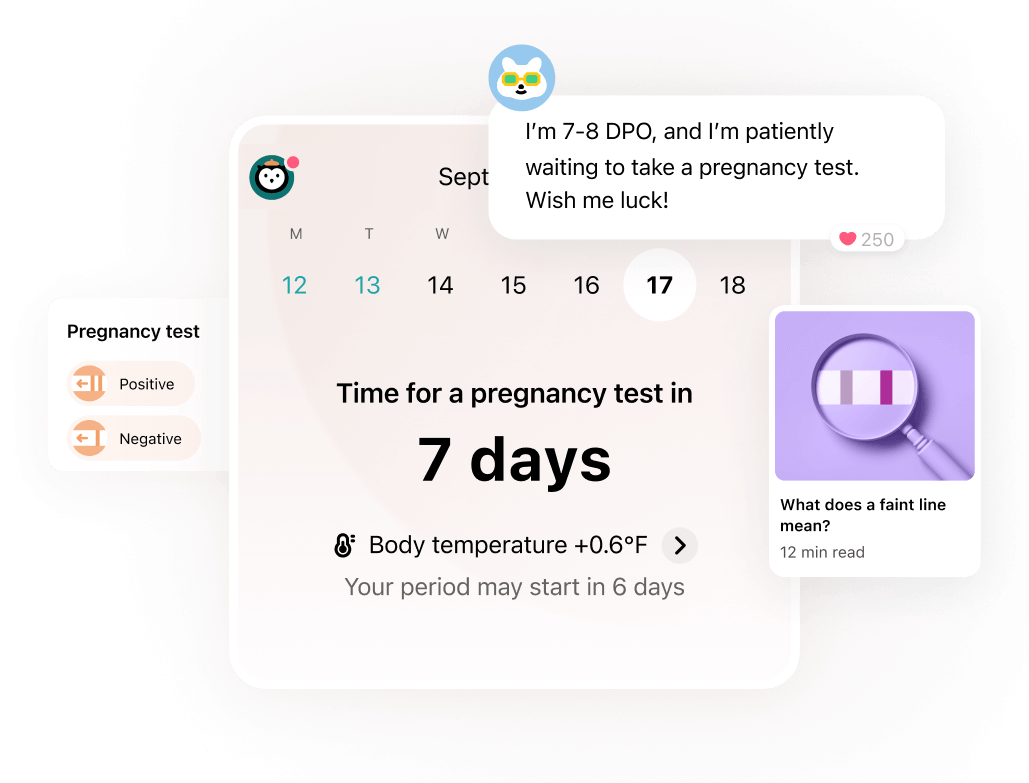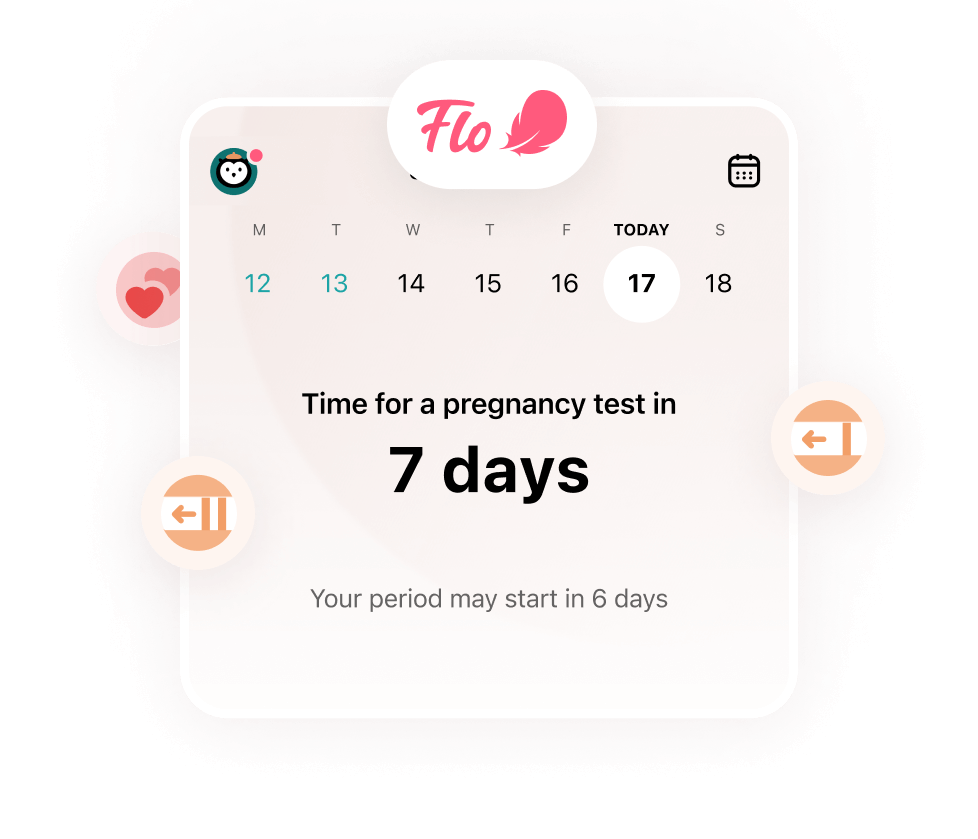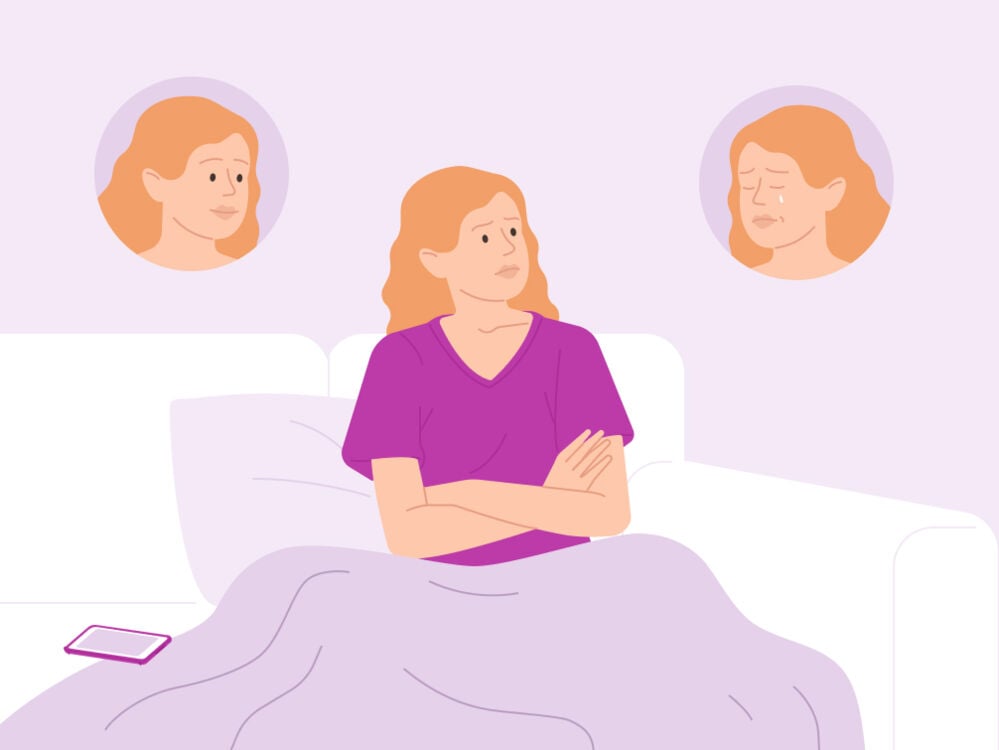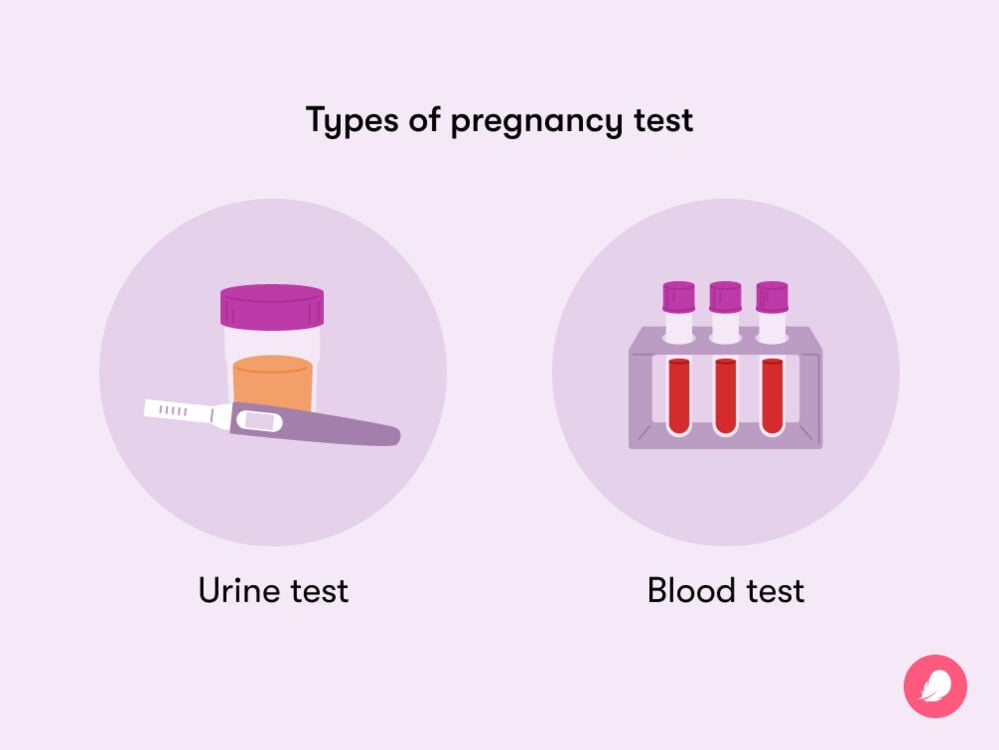Taking a pregnancy test too soon could result in a false negative. Find out when to take a pregnancy test, the different types, and how accurate they can be.
-
Tracking cycle
-
Getting pregnant
-
Pregnancy
-
Help Center
-
Flo for Partners
-
Anonymous Mode
-
Flo app reviews
-
Flo Premium New
-
Secret Chats New
-
Symptom Checker New
-
Your cycle
-
Health 360°
-
Getting pregnant
-
Pregnancy
-
Being a mom
-
LGBTQ+
-
Quizzes
-
Ovulation calculator
-
hCG calculator
-
Pregnancy test calculator
-
Menstrual cycle calculator
-
Period calculator
-
Implantation calculator
-
Pregnancy weeks to months calculator
-
Pregnancy due date calculator
-
IVF and FET due date calculator
-
Due date calculator by ultrasound
-
Medical Affairs
-
Science & Research
-
Pass It On Project New
-
Privacy Portal
-
Press Center
-
Flo Accuracy
-
Careers
-
Contact Us
When to take a pregnancy test for more accurate results


Every piece of content at Flo Health adheres to the highest editorial standards for language, style, and medical accuracy. To learn what we do to deliver the best health and lifestyle insights to you, check out our content review principles.
If you think you could be pregnant (and particularly if you want to be), it can be really tempting to rush out to buy a test. Pregnancy is life-changing so it’s natural to want to know as early as possible. However, if you take a test too early, you could run the risk of getting an inaccurate result.
So — why does the timing of taking a pregnancy test matter so much? When should you take a pregnancy test? And what other things can improve the accuracy of your result? With the help of Dr. Sara Twogood, obstetrician and gynecologist, Cedars-Sinai Medical Group, California, US, let’s get into it.
Key takeaways
- For the most accurate result, the best time to take a pregnancy test is after a no-show period. If you have a regular period, it’s best to wait until it’s late before taking a test.
- If you test earlier than this, you could get a false negative result.
- At-home pregnancy tests are generally pretty accurate, but there are important things you need to know to lessen the chance of error or a false result.
- Other signs of early pregnancy, besides a missed period, include bloating, tender boobs, and nausea, though pregnancy isn’t the only thing that can cause these symptoms. They could also be premenstrual symptoms. Confusing, right?
- Flo for Pregnancy is on hand to support you throughout your pregnancy journey, and you can use a cycle-tracking app like Flo to monitor when you might have a late or missed period.

 Over
7.8M
ratings averaging
4.8/5
*
Over
7.8M
ratings averaging
4.8/5
*
Make sense of pregnancy testing with the Flo app
- Know when it’s the right time to take a test.
- Log results of previous pregnancy tests.
- Chat with others who are trying.
 Over
7.8M
ratings averaging
4.8/5
*
Over
7.8M
ratings averaging
4.8/5
*

Hoping for a positive pregnancy test?
The Flo app can help you on your path to parenthood.

 Over
7.8M
ratings averaging
4.8/5
*
Over
7.8M
ratings averaging
4.8/5
*
Make sense of pregnancy testing with the Flo app
- Know when it’s the right time to take a test.
- Log results of previous pregnancy tests.
- Chat with others who are trying.
Take a quiz
Find out what you can do with our Health Assistant
How do pregnancy tests work?
To understand why the timing of a pregnancy test is important, it helps to know a little about how they work.
When you’re pregnant, your body produces a hormone called human chorionic gonadotropin (hCG). Pregnancy tests work by checking your pee for traces of hCG.
The timing of when you do a test is so important because your body only starts producing hCG after implantation. This is when a fertilized egg is attached to the lining of your uterus. It can happen around six to 10 days after conception or when you’re around three weeks pregnant. HCG levels start low but rise significantly through early pregnancy.
The higher your hCG levels are, the easier it is for a test to detect. So you need to give the hCG a chance to build first in order for it to show up on hCG pregnancy tests.
When should you take a pregnancy test?
This is the big question. In short, if you think you could be pregnant, or you want to know if you are, wait to see if your next period shows. And if it doesn’t, that’s when you take an at-home test.
“The earliest time you should take a pregnancy test is the first day of a [late or] missed period,” says Dr. Twogood. “But most of the time, it’s recommended to wait another day or two after that — because cycle lengths can vary across months.” If you aren’t sure when your period is supposed to be, you can use a cycle-tracking app like Flo.
Waiting until your period is due to do a pregnancy test might sound easier said than done. Whether you’re trying to get pregnant or not, not knowing if you could be pregnant can be really frustrating. However, this window when your period hasn’t arrived is when your hCG levels will have had enough time to reliably build — giving you a better chance of accurate pregnancy test results.
Some brands of pregnancy tests claim to be able to detect hCG sooner than this, and this is possible. But at-home pregnancy tests are always more likely to be accurate if they’re taken the day after you expect your period to arrive. If you’re unsure of what day to take a pregnancy test, you can try Flo’s pregnancy test calculator to understand when a test might be more accurate based on your cycle.
Can you take a pregnancy test too early?
Understanding at what point in your cycle you can take a test is important because you can absolutely take a pregnancy test too early. As mentioned above, if your body hasn’t had a chance to produce enough hCG yet, it may not show up on a pregnancy test — even if you’re pregnant. This could mean you end up with what is known as a false negative result.
That’s why it’s recommended to wait until your period is at least one day late to get more accurate pregnancy test results. Waiting a few days to a week after that — when hCG will have had even more time to build — is even better. You can always do multiple tests to give yourself peace of mind.
When is the best time to take a pregnancy test?
Since there’s a recommended point in your cycle that you take a pregnancy test, you might be curious if there’s a time of day when you should be doing a test too. Is your pee more hCG-potent in the morning?
While this might feel like good logic, you can actually take a pregnancy test at any time of day. “Technically, your urine could be diluted if you’re overhydrated,” says Dr. Twogood. “So let’s say you’ve had a gallon [or a liter] of water; hCG levels might be harder to detect.” This is why it’s sometimes said that taking a home pregnancy test in the morning can improve the accuracy — since if you’ve been asleep all night, you’re less likely to have had lots to drink.
“But I would look at the color of the urine as an indicator of how hydrated someone is rather than the time of day,” says Dr. Twogood. “If the urine is a straw-yellow color, it should be concentrated enough.”
Other signs you might be pregnant
A late or missed period is the most common sign of pregnancy (though there are lots of reasons you can have late or missed periods and not be pregnant). But you may be wondering about the other signs of pregnancy, especially if you have irregular periods.
“It tends to be bloating, breast tenderness, and sometimes nausea that people notice most,” says Dr. Twogood. Food cravings, mood swings, and fatigue can also be very early signs of pregnancy. And some people report mild cramps, too.

However, the tricky thing is that all of these symptoms can be a pretty standard part of premenstrual syndrome (PMS) — so if your period is late, and you’re experiencing any of them, it doesn’t necessarily mean you’re pregnant. It could just mean your period’s about to start.
“That’s why tracking your cycle is helpful so that you know what’s typical for you around the PMS stage,” says Dr. Twogood. “Then if something feels different one month, and you’re getting symptoms you don’t usually have, it can be easier to recognize.”
What kind of pregnancy tests are there?
Urine pregnancy tests
Otherwise known as peeing on a stick, urine pregnancy tests are the home pregnancy tests you can do yourself. They can be picked up inexpensively in most drug and grocery stores or sometimes for free from local health centers or services.
Just remember that many home pregnancy tests can work slightly differently, so it’s important to read and follow the instructions for whichever one(s) you get. Generally speaking, you’ll either need to pee directly onto the stick or pee into a cup and dip the stick into it. These tests detect hCG in your pee.

Blood pregnancy tests
Blood tests are carried out by a health care provider. They’re much more sensitive, meaning they can pick up lower levels of hCG, and provide a more accurate result at an earlier stage than the at-home urine tests.
That said, blood tests are less convenient and more expensive and will typically give the same result as an at-home urine test done properly. So, your doctor may suggest waiting and doing an at-home urine test before coming into a clinic to have your pregnancy confirmed.
How accurate are pregnancy tests?
Many at-home pregnancy tests claim to be more than 99 % accurate when used after the first day of a late or missed period. But it’s worth bearing in mind that these figures are achieved in a lab under “perfect” conditions and don’t account for some of the human error we see in real life.
A 2019 study found that some at-home tests do meet that 99% accuracy mark, even when done by regular folks in real-life settings. But the study also found that some don’t, with others coming out between 82% and 96% accuracy in real-life settings.
To ensure your test result is as accurate as possible:
- Take your test, at the earliest, from the first day of a late or missed period. Waiting up to a week after your period was due will boost accuracy even more.
- Always read and follow the instructions that came with your test. Some tests work differently than others, so follow the instructions in your pack.
- Make sure you leave the test for the specified amount of time before checking it. It can be tempting to look before, but don’t look at your results and throw the test away until the allotted period of time is up.
- Don’t drink too much water beforehand. The temptation might be to drink lots to produce more pee, but you might dilute your urine.
- Make sure the test is within its expiration date. Pregnancy tests can expire, so if the date on the box has passed, go out and get a new test.
If you get a negative pregnancy test but you’re worried you might still be pregnant, wait a week and then take another test. You can also see your health care provider to be sure.
What to do if your pregnancy test is positive
Whether you were trying to conceive or not, a positive pregnancy test result can come with a lot of big feelings — all of which are completely valid.
Whether it’s news you wanted, news you didn’t, or somewhere in between, the next thing to do is make an appointment with your doctor, who can confirm the result and discuss your care and options going forward.
It’s up to you when you want to announce a pregnancy to friends and family. You don’t have to wait twelve weeks if you don’t want to, but equally, you also should never feel pressured to announce that you’re expecting. Everyone is different, so take things one step at a time and do what feels right for you.
FAQs
How do I know if I’m pregnant?
In short, you can’t know if you’re pregnant without taking a pregnancy test. The most common signs of pregnancy include a missed period, tender boobs, nausea, and fatigue — but pregnancy isn’t the only possible cause of these things. So, again, the only way to know is to take that test.
Could I still be pregnant if the test is negative and I didn’t get my period?
False-negative results are possible. If it’s been a week since a negative result, and your period still hasn’t shown, take another test. If it’s still negative, remember that there are other reasons for delayed or missed periods. Speak to your doctor if you notice big shifts in your cycle, like missing your period.
Can you be two weeks pregnant and have a period?
You can’t have a period while pregnant, but some light non-menstrual bleeding or spotting can happen in early pregnancy. You could potentially confuse this with a period. Light “implantation bleeding” can happen when a fertilized egg implants in the lining of the uterus. The cervix may also generally bleed more easily during pregnancy. This can happen after sex. If you are pregnant and notice some light bleeding or spotting, then it’s always a good idea to speak to your health care provider to ensure that nothing more serious is going on.


Hey, I'm Anique
I started using Flo app to track my period and ovulation because we wanted to have a baby.


The Flo app helped me learn about my body and spot ovulation signs during our conception journey.


I vividly
remember the day
that we switched
Flo into
Pregnancy Mode — it was
such a special
moment.
Real stories, real results
Learn how the Flo app became an amazing cheerleader for us on our conception journey.
References
“Bleeding during Pregnancy.” Mayo Clinic, 20 Jan. 2022, www.mayoclinic.org/symptoms/bleeding-during-pregnancy/basics/causes/sym-20050636.
“Bleeding during Pregnancy.” The American College of Obstetricians and Gynecologists, May 2021, www.acog.org/womens-health/faqs/bleeding-during-pregnancy.
Boxer, Jackie, et al. “Home Pregnancy Tests in the Hands of the Intended User.” Journal of Immunoassay and Immunochemistry, vol. 40, no. 6, Sep. 2019, pp. 642–52, https://doi.org/10.1080/15321819.2019.1671861.
“Doing a Pregnancy Test.” NHS, www.nhs.uk/pregnancy/trying-for-a-baby/doing-a-pregnancy-test/. Accessed 3 July 2024.
Gnoth, C., and S. Johnson. “Strips of Hope: Accuracy of Home Pregnancy Tests and New Developments.” Geburtshilfe Und Frauenheilkunde, vol. 74, no. 7, July 2014, pp. 661–69, doi: 10.1055/s-0034-1368589.
“Home Pregnancy Tests: Can You Trust the Results?” Mayo Clinic, 23 Dec. 2022, www.mayoclinic.org/healthy-lifestyle/getting-pregnant/in-depth/home-pregnancy-tests/art-20047940.
“Human Chorionic Gonadotropin.” Cleveland Clinic, my.clevelandclinic.org/health/articles/22489-human-chorionic-gonadotropin. Accessed 3 July 2024.
Nwabuobi, Chinedu, et al. “HCG: Biological Functions and Clinical Applications.” International Journal of Molecular Sciences, vol. 18, no. 10, Sep. 2017, doi.org/10.3390/ijms18102037.
“Pregnancy Tests.” Cleveland Clinic, my.clevelandclinic.org/health/diagnostics/9703-pregnancy-tests. Accessed 3 July 2024.
“Premenstrual Syndrome.” ScienceDirect, www.sciencedirect.com/topics/pharmacology-toxicology-and-pharmaceutical-science/premenstrual-syndrome. Accessed 3 July 2024.
"Symptoms of Pregnancy: What Happens First.” Mayo Clinic, 13 Mar. 2024, www.mayoclinic.org/healthy-lifestyle/getting-pregnant/in-depth/symptoms-of-pregnancy/art-20043853.
“What Are Some Common Signs of Pregnancy?” Eunice Kennedy Shriver National Institute of Child Health and Human Development, www.nichd.nih.gov/health/topics/pregnancy/conditioninfo/signs. Accessed 3 July 2024.
Wilcox, A. J., et al. “Natural Limits of Pregnancy Testing in Relation to the Expected Menstrual Period.” JAMA, vol. 286, no. 14, Oct. 2001, pp. 1759–61, doi:10.1001/jama.286.14.1759.
History of updates
Current version (18 July 2024)
Published (06 March 2019)
In this article

Get your personal guide to fertility
-
Learn how to read your body's ovulation signals
-
Find daily conception tips from our experts
-
Chat with others who are trying to get pregnant




